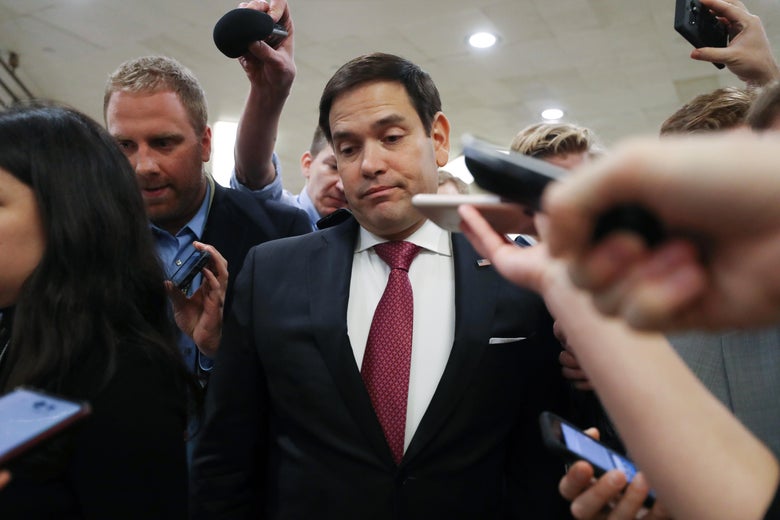
The man the president knows as “Lil’ Marco.”
Mario Tama/Getty Images
As Donald Trump’s impeachment trial drew towards a close on Friday with a 51-49 vote against the Senate hearing from witnesses or seeking documents, Republican Senators were coming out of the woodwork to explain why they’d refused to try to obtain any new evidence. Ultimately, only Sens. Susan Collins and Mitt Romney broke party lines to vote with the 47 members of the Democratic caucus in favor of calling witnesses.
This will be the first Senate impeachment trial in American history without witnesses called, and opinon polls show broad public support for witnesses, so the Republican decision to cut the proceedings short would seem to be hard to defend.
Still, these Senators tried their best! Here are the five most pathetic excuses Republican senators have offered to avoid calling witnesses according to cravenness.
5. Sen. Cory Gardner of Colorado
Gardner, who is up for re-election in Colorado this Fall, came out against witnesses already on Wednesday. His statement to Colorado Politics was:
I do not believe we need to hear from an 18th witness. I have approached every aspect of this grave constitutional duty with the respect and attention required by law, and have reached this decision after carefully weighing the House managers and defense arguments and closely reviewing the evidence from the House, which included well over 100 hours of testimony from 17 witnesses.
While this statement doesn’t appear too craven, you have to recall that Gardner represents a state with the greatest opposition to Trump of almost any represented by a Republican in the Senate and that his coming out early against witnesses helped Majority Leader Mitch McConnell close ranks on the subject. Framing the question as whether to go from 17 witnesses to 18—rather than whether to go from zero to one—neatly captures the Senate’s majority’s decision to pretend it was the House’s job to gather all the facts, and that they were helpless to try to learn anything more on their own.
4. Sen. Marco Rubio of Florida
Rubio, who was dubbed “Lil’ Marco” by the president the Florida senator now seeks to exonerate, released a video and issued a lengthy blog post on Friday explaining his decision. That statement read:
[N]ew witnesses that would testify to the truth of the allegations are not needed for my threshold analysis, which already assumed that all the allegations made are true.
And from the video:
Removing the president would in my opinion inflict extraordinary trauma on our nation, which is already deeply divided and polarized. Half the country would view his removal as nothing less than a coup d’etat and I ask you what scheme could Vladimir Putin come up with that would divide us more than that removal would. So I’m not going to vote in favor of tearing this country apart any further, or fueling a raging fire that already threatens our country.
The intense strings soundtrack accompanying the video pairs perfectly with the melodramatic and cynical message that to save the country from election interference, you must allow election interference.
3. Sen. Lamar Alexander of Tennessee
Alexander’s message on Thursday night that he was voting against witnesses was noteworthy because he had been considered a plausible swing vote in favor of witnesses, and because of the implausible reason he offered for refusing to swing. Trump, he explained, was guilty of what the House managers had charged him with, and so no more information was needed. What they charged, though, “does not meet the United States Constitution’s high bar for an impeachable offense.” While Alexander finds Trump’s conduct to be “inappropriate,” he told NPR on Friday that he will still support the president in November’s election.
2. Sen. Ben Sasse of Nebraska
Sasse fashioned his career in the Senate, as Slate’s Ben Mathis-Lilley described it, as a “performatively deep thinker, an advocate of public decency.” What does the man who wrote a book titled The Vanishing American Adult think of Trump’s conduct in the Ukraine affair and whether or not witnesses should be called in his Senate trial? “Let me be clear; Lamar speaks for lots and lots of us,” Sasse told CNN’s Manu Raju, doing the presumably adult thing of deferring his reasoning for the most important decision of his public life to someone else. Even there, the straight-talking champion of integrity wouldn’t take the risk of repeating those words with his own mouth. “I asked if he believes then that Trump acted inappropriately,” Raju reported. “Sasse didn’t answer.”
1. Sen. Lisa Murkowski of Alaska
Murkowski put to rest on Friday any questions about whether Chief Justice John Roberts might have to decide to break a 50-50 tie in favor of witnesses, or—by declining to vote at all—against them. Murkowski framed her vote as a brave one to protect the chief justice from a Democratic effort to “drag the Supreme Court into the fray, while attacking the Chief Justice.” She continued: “I will not stand for nor support that effort. We have already degraded this institution for partisan political benefit, and I will not enable those who wish to pull down another.” By smearing her colleagues who sought to uncover the full truth of Trump’s misconduct as vicious partisans while casting herself as the hero, Murkowski presented the most self-serving possible justification for her cowardice of them all.
Readers like you make our work possible. Help us continue to provide the reporting, commentary and criticism you won’t find anywhere else.
Join Slate Plusfrom Slate Magazine https://ift.tt/36Kznpk
via IFTTT
沒有留言:
張貼留言